Description
Botanical: Rubus idaeus
Other common names: Raspberry Leaf, Bramble, Hindberry, Reapberry, Bramble of Mount Ida
Red Raspberry is rich in minerals and vitamins that promote the health of hair, skin, nails, bones and teeth. It has an old reputation as a woman's friend that helps to tone the uterine muscles (particularly valuable during labor and delivery and recovery after birth). Moreover, Red Raspberry is said to relieve menstrual cramps and reduce excessive bleeding during menstruation.
Country of Origin: United States
Beneficial Uses:
Red Raspberry is considered an excellent astringent, which makes it an effective treatment for a number of complaints. The high tannin content is said to help to control diarrhea by preventing the flow of fluids into the intestines, thereby helping to solidify the stool.
Red Raspberry has been used for centuries to strengthen the reproductive system in women, particularly during pregnancy. The herb is thought to regulate and tone the uterine muscles. If the smooth muscle is tight, the herb is said to relax it; likewise, if the muscle is relaxed Red Raspberry causes contractions, and when taken during the last two months of pregnancy, it is believed to strengthen and tone the uterine muscles and stimulate labor and delivery and possibly even help to shorten delivery and ease pain.
After birth, Red Raspberry is taken for several weeks to help reduce swelling and bleeding and return the uterus to its normal tone. By toning the pelvic muscles, Red Raspberry has been used as a traditional remedy for bed-wetting.
To further support women's health, Red Raspberry is said to relieve heavy cramping during menstruation. The ferulic acid content in the herb is said to be a uterine relaxant, stimulating the muscles that support the uterus and allowing for easier menstrual flow. It is thought to help relieve premenstrual syndrome (PMS) and also reduce excessive menstrual bleeding. There are reports that Red Raspberry may also help to alleviate hot flashes during menopause and that it is a natural estrogen promoter.
Red Raspberry is said to possess antiviral properties, and some studies have shown that it kills virus (including herpes) and fungi in cell cultures. It was said to be effective against herpes virus II, influenza virus, and polio virus I, among others.
Contraindications:
Pregnant women should not use Raspberry until the last two months of pregnancy, and then, only under the supervision of a knowledgeable physician.


